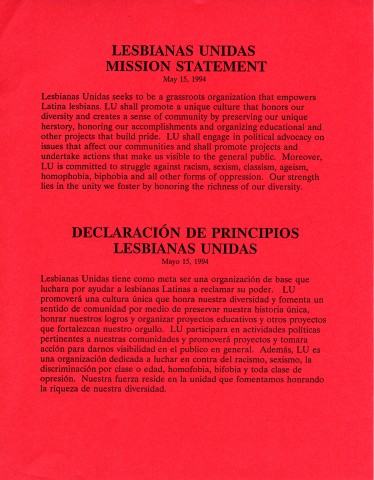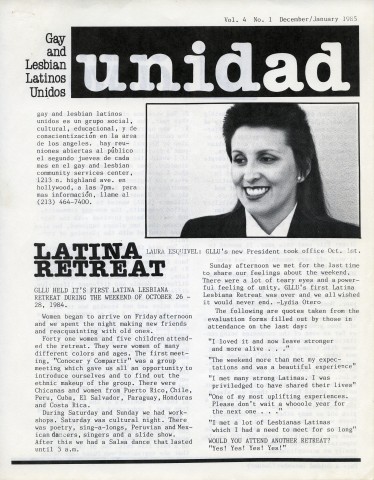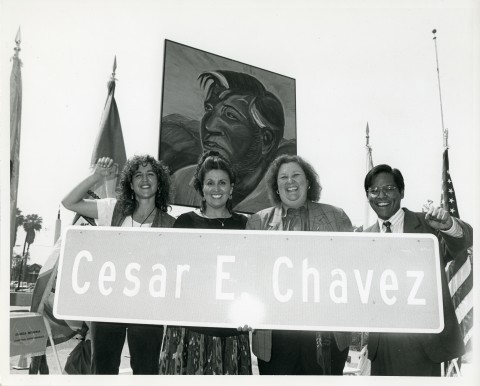CSRC Blog: "Laura Esquival: A Latina Lesbian Activist's Archival Story"
As someone who has experienced a nontraditional educational and professional journey, I strongly connected with Latina lesbian activist Laura Esquivel as I processed her collection of papers at the UCLA Chicano Studies Research Center (CSRC). Those of us who have nonlinear academic and professional journeys commonly experience imposter syndrome because it often feels like we are struggling when we juggle school, work, and other responsibilities. Like Esquivel, I received an associate’s degree from East Los Angeles College and transferred to the California State University system, where I received my bachelor’s degree from California State University, Los Angeles (CSULA). Esquivel received hers from California State University, Dominguez Hills (CSUDH). She continued her education and earned a master’s degree in political science from CSULA and another in public administration from Harvard. She currently lives in Maryland, where she is a senior legislative representative at Earth Justice.
In 2007, Esquivel donated a portion of her papers to the CSRC Library. Processing Esquivel’s collection and creating the finding aid is one of the inaugural projects of Latina Futures, 2050 Lab, a joint project of the CSRC and the UCLA Latino Policy and Politics Institute (LPPI). Latina Futures honors the presence of Latinas in US history and calls attention to the critical and often underdocumented roles that they have played in the nation’s early racial and gender justice movements. These largely ignored or erased histories are crucial to research on many social movements and for debates about equitable law and policy.
What impact has Laura Esquivel had as a Latina lesbian activist? Esquivel worked with nonprofit organizations that specifically served the Latina/o and LGBTQ+ communities. In about 1980, she joined Gay Latinos Unidos, which became Gay and Lesbian Latinos Unidos (GLLU) in 1982. GLLU was the first organization in the broader Los Angeles region to advocate for LGBTQ+ and Latina/o communities. A grassroots effort, GLLU members built relationships with elected officials and policymakers and, in the process, created a political profile that benefited both GLLU and the communities for which they advocated. In 1983, Esquivel cofounded Lesbianas Unidas (LU), a GLLU task force, to address issues that specifically concerned Latina lesbians. A pivotal moment in her activist journey was in 1984, when, at age twenty-six, she served as the first female president of GLLU. Esquivel went on to cofound the National Latino/a Lesbian Gay Organization (LLEGÓ), based in Washington, DC in 1987, and continued to be involved in LU after the separation of LU and GLLU in 1994.


Lesbianas Unidas was associated with Gay and Lesbian Latinos Unidos until 1994, when it separated from the larger organization and issued this mission statement. “Lesbianas Unidas Mission Statement,” May 15, 1994, Laura Esquivel Papers, UCLA Chicano Studies Research Center Library.


Laura Esquivel in 1984, when she was named president of Gay and Lesbian Latinos Unidos. The photograph appeared in Unidad, the GLLU newsletter. Unidad, vol. 4, no. 1, December 1984–January 1985, Laura Esquivel Papers, UCLA Chicano Studies Research Center Library.
Esquivel deeply admired the work of civil rights leader and cofounder of the United Farm Workers (UFW), César Chávez. In fact, one of the documents in the collection is a tribute titled “Cesar-Chavez-Remembered,” written by Esquivel on June 24, 1993. She reflects on how much she cherished the memory of hearing Chávez speak about the connection between racism and homophobia at the March on Washington for Lesbian and Gay Rights on October 12, 1987. Chávez publicly advocated for LGBTQ+ communities, and Esquivel recalls that members of the UFW supported GLLU in multiple events in the 1980s, including the pride marches and rallies organized by Christopher Street West, an LA organization that supports the LGBTQ+ community. In Esquivel’s tribute, she emphasized the powerful meaning of the UFW’s support: “This was a vital and empowering connection for those of us who felt the need to integrate our work as Chicana/o activists with our identities as gays and lesbians.” Esquivel related a story about how she met Chávez backstage after he spoke, recalling that she “attempted to convey to him what his example meant” when she was a young Chicana in the 1960s and 1970s. She wrote, “He hugged me tight that day and gave me words of encouragement which I will never forget.”
After years in the nonprofit sector, Esquivel continued serving LGBTQ+ communities through electoral, legislative, and policy work. In the 1990s, she was an aide for the first openly lesbian Los Angeles City Council member, Jackie Goldberg. During Esquivel’s time with Goldberg, she helped prepare a resolution, passed by the Los Angeles City Council on October 16, 1998, in which Goldberg called on the US Senate to support S. 1529, the Hate Crime Preventions Act, which would have modified federal law to include hate crimes against sexual orientation and enhanced the enforcement of hate crime laws by federal authorities. The resolution was a response to the violent homophobic murder of Matthew Shepard, a gay first-year college student at the University of Wyoming, on October 12, 1998. The Matthew Shepard and James Byrd Jr. Hate Crimes Prevention Act was signed into law in October 2009.


Sharon Delugach and Laura Esquivel (first and second from left) stand next to Jackie Goldberg and Gerald Gubatan in a photograph taken during the dedication ceremony that marked the renaming of Brooklyn Avenue to César E. Chávez Avenue, Los Angeles, March 31, 1994. Gelatin silver print by unknown photographer, Laura Esquivel Papers, UCLA Chicano Studies Research Center Library.
As an undergraduate, I struggled to find a woman of color to look up to—someone who shared a similar educational experience and, despite the challenges, had accomplished her goals. I remember that I felt a sense of kinship with Esquivel as I read about her life in “An East L.A. Warrior Who Bridged the Latina/o and the Gay Worlds,” her essay in the book Queer Brown Voices (University of Texas Press, 2015). Her early work as a Latina lesbian activist provided an essential role model for me, as it does for others who want to serve as vigorous advocates for disenfranchised and vulnerable communities. Discrimination against and legislative attacks on LGBTQ+ and Latina/o communities continue at local, state, and national levels, reminding us that Esquivel’s work remains an essential touchstone for Latina leadership.
Vanessa Esperanza Quintero, a lifelong resident of southeast Los Angeles, is currently a graduate student researcher at the CSRC and is completing the master’s program in library and information science at UCLA. Her research explores the intersection of ethical practices and the law with arts and culture collections, arts and culture preservation, and information systems. She became involved in the field of information studies and arts and culture collections through her recognition of the need for advocacy through amplification and preservation of BIPOC and LGBTQ+ arts, ephemera, culture, and activism.
This post is part of the Latina Futures 2050 Lab, research project based at the UCLA Chicano Studies Research Center.
